- Home
- Jojo Moyes
After You Page 17
After You Read online
Page 17
that stuff you wear.
I opened the door, and Lily was standing there. She stepped forward and gave me a brief, emphatic hug, so tight that my ribs hurt. Then she turned and, without a word, disappeared back into the living room.
• • •
The day dawned brighter, and our mood lifted a little with it. We drove several hours to a tiny village in Oxfordshire, a place of walled gardens and mustard-tinted, sunbaked stone walls. I prattled on during the journey, mostly to hide my nerves about seeing Mrs. Traynor again. The hardest thing about talking to teenagers, I had discovered, was that whatever you said inevitably came across like something an elderly aunt would say at a wedding.
“So what things do you like doing? When you’re not at school?”
She shrugged.
“What do you think you might want to do after you leave?”
She gave me the look.
“You must have had hobbies growing up?”
She reeled off a dizzying list: show jumping, lacrosse, hockey, piano (grade five), cross-country running, county-level tennis.
“All that? And you didn’t want to keep any of it up?”
She sniffed and shrugged simultaneously, then put her feet up on th dashboard, as if the conversation were closed.
“Your father loved to travel,” I remarked, a few miles on.
“You said.”
“He once told me he’d been everywhere except North Korea. And Disneyland. He could tell stories about places I’d never even heard of.”
“People my age don’t go on adventures. There’s nowhere left to discover. And people who backpack in their gap year are unbelievably tedious. Always yakking on about some bar they discovered in Ko Phang Yan, or how they scored amazing drugs in the Burmese rain forest.”
“You don’t have to backpack.”
“Yeah, but once you’ve seen the inside of one Mandarin Oriental you’ve seen them all.” She yawned. “I went to school near here once,” she observed later, peering out of the window. “It was the only school I actually liked.” She paused. “I had a friend called Holly.”
“What happened?”
“Mum got obsessed with the idea that it wasn’t the right sort of school. She said they weren’t far enough up the league tables or something. It was just some little boarding school. Not academic. So they moved me. After that I couldn’t be arsed making friends. What’s the point if they’re just going to move you on again?”
“Did you keep in touch with Holly?”
“Not really. There’s no point when you can’t actually see each other.” I had a vague memory of the intensity of teenage female relationships; more of a passion than a normal friendship.
“What do you think you’ll do? I mean if you really aren’t going to go back to school?”
“I don’t like thinking ahead.”
“But you’re going to have to think about something, Lily.”
She closed her eyes for a minute, then put her feet back down and peeled some purple varnish off her thumbnail. “I don’t know, Louisa. Perhaps I’ll just follow your amazing example and do all the exciting things you do.”
I took three deep breaths, just to prevent myself from stopping the car on the motorway. Nerves, I told myself. It was just her nerves. And then, just to annoy her, I turned on Radio 2 really loudly and kept it there the rest of the way.
• • •
We found Four Acres Lane with help from a local dog walker, and pulled up outside Fox’s Cottage, a modest white building with a thatched roof. Outside, scarlet roses tumbled around an iron arch at the start of the garden path, and delicately colored blooms fought for space in neatly tended beds. A small hatchback car sat in the drive.
“She’s gone down in the world,” said Lily, peering out.
“It’s pretty.”
“It’s a shoebox.”
I sat, listening to the engine tick down. “Listen, Lily. Before we go in. Just don’t expect too much,” I said. “Mrs. Traynor’s sort of formal. She takes refuge in manners. She’ll probably speak to you like she’s a teacher. I mean, I don’t think she’ll hug you, like Mr. Traynor did.”
“My grandfather is a hypocrite.” Lily sniffed. “He makes out like you’re the greatest thing ever, but really he’s just pussy-whipped.”
“And please don’t use the term ‘pussy-whipped.’”
“There’s no point pretending to be someone I’m not,” Lily said sulkily.
We sat there for a while. I realized that neither of us wanted to be the one to walk up to the door. “Shall I try to call her one more time?” I said, holding up my phone. I’d tried twice that morning but it had gone straight to voice mail.
“Don’t tell her straight away,” she said suddenly. “Who I am, I mean. I just . . . I just want to see who she is. Before we tell her.”
“Sure,” I said, softening. And before I could say anything else, Lily was out of the car and striding up toward the front gate, her hands bunched into fists like a boxer about to enter a ring.
• • •
Mrs. Traynor had gone quite, quite gray. Her hair, which had been tinted dark brown, was now white and short, making her look much older than she actually was, or like someone recently recovered from a serious illness. She was probably a stone lighter than when I had last seen her, and there were liver-colored hollows under her eyes. She looked at Lily with a confusion that told me she didn’t expect any visitors, at any time. And then she saw me, and her eyes widened. “Louisa?”
“Hello, Mrs. Traynor.” I stepped forward and held out a hand. “We were in the area. I don’t know if you got my letter. I just thought I’d stop by and say hello . . .”
My voice—false and unnaturally cheery—tailed off. The last time she had seen me was when I helped clear her dead son’s room; the time before that at his last breath. I watched her relive both those facts now. “We were just admiring your garden.”
“David Austin roses,” said Lily.
Mrs. Traynor looked at her as if noticing her for the first time. Her smile was slight and wavering. “Yes. Yes, they are. How clever of you. It’s—I’m very sorry. I don’t have many visitors. What did you say your name was?”
“This is Lily,” I said, and watched as Lily took Mrs. Traynor’s hand and shook it, studying her intently as she did so.
We stood there on her front step for a moment, and then finally, as if she thought she had no alternative, Mrs. Traynor turned and pushed the door open. “I suppose you’d better come in.”
• • •
The cottage was tiny, its ceilings so low that even I had to duck when moving from the hall to the kitchen. I waited as Mrs. Traynor made tea, watching Lily walk restlessly around the tiny living room, navigating her way among the few bits of highly polished antique furniture that I remembered from my days in Granta House, picking things up and putting them down again.
“And . . . how have you been?”
Mrs. Traynor’s voice was flat, as if it were not a question she was really seeking an answer to.
“Oh, quite well, thank you.”
Long silence.
“It’s a lovely village.”
“Yes. Well. I couldn’t really stay in Stortfold . . .” She poured boiling water into the teapot and I couldn’t help but be reminded of Della, moving heavily around Mrs. Traynor’s old kitchen.
“Do you know many people in the area?”
“No.” She said it as if that might have been the sole reason for her moving there. “Would you mind taking the milk jug? I can’t fit everything on this tray.”
There followed a painfully labored half hour of conversation. Mrs. Traynor, a woman infused with the instinctive upper-middle-class skill of being all over any social situation, had apparently lost the ability to communicate. She seemed only half with us when I spoke. She asked a question, then asked it again ten minutes later, as if she had failed to register the answer. I wondered about the use of antidepressants. Lily watched her sur
reptitiously, her thoughts ticking across her face, and I sat between them, my stomach in an increasingly tight knot, waiting for something to happen.
I chattered on into the silence, talking of my awful job, things I’d done in France, the fact that my parents were well, thank you—anything to end the awful, oppressive stillness that crept across the little room whenever I stopped. But Mrs. Traynor’s grief hung over the little house like a fog. If Mr. Traynor had seemed exhausted by sadness, Mrs. Traynor appeared to be swallowed up by it. There was almost nothing left of the brisk, proud woman I had known.
“What brings you to this area?” she said, finally.
“Um . . . just visiting friends,” I said.
“How do you two know each other?”
I said, “I . . . I knew Lily’s father.”
“How nice,” said Mrs. Traynor, and we smiled awkwardly. I watched Lily, waiting for her to say something, but she had frozen, as if she, too, were overwhelmed, faced with the reality of this woman’s pain.
We drank a second cup of tea and remarked upon her beautiful garden for the third, possibly fourth time, and I fought the sensation that our enduring presence was requiring a sort of superhuman effort on her behalf. She didn’t want us there. She was far too polite to say so, but it was obvious that she really just wanted to be on her own. It was in every gesture, every forced smile, every attempt to stay on top of the conversation. I suspected that the moment we were gone she would simply retreat into a chair and stay there, or shuffle upstairs and curl up in her bed.
And then I noticed it: the complete absence of photographs. Whereas Granta House had been filled with silver-framed pictures of her children, of their family, of ponies, skiing holidays, distant grandparents, this cottage was bare. A small bronze of a horse, a watercolor of some hyacinths, but no people. I found myself shifting in my seat, wondering if I had simply missed them, gathered on some occasional table or windowsill. But no; the cottage was brutally impersonal. I thought of my own flat, my utter failure to personalize it or allow myself to turn it into any kind of a home. And I felt suddenly leaden, and desperately sad.
What have you done to us all, Will?
“It’s probably time to go, Louisa,” said Lily, looking pointedly at the clock. “You did say we wouldn’t want to hit traffic.”
I gazed at her. “But—”
“You said we shouldn’t stay too long.” Her voice was high and clear.
“Oh. Yes. Traffic can be very tedious.” Mrs. Traynor began to rise from her chair.
I was glaring at Lily, about to protest again, when the phone rang. Mrs. Traynor flinched, as if the sound were now unfamiliar. She looked at both of us, as if wondering whether to answer it, and then, perhaps realizing that she couldn’t ignore it while we were there, she excused herself and walked through to the other room, where we heard her answer.
“What are you doing?” I said.
“It just feels all wrong,” said Lily miserably.
“But we can’t go without telling her.”
“I just can’t do this today. It’s all . . .”
“I know it’s scary. But look at her, Lily. I really think it might help her if you told her. Don’t you?”
Lily’s eyes widened.
“Tell me what?”
My head swiveled. Mrs. Traynor was standing motionless by the door to the little hallway. “What is it you need to tell me?”
Lily looked at me, then back toward Mrs. Traynor. I felt time slow around us. She swallowed, then lifted her chin a little. “That I’m your granddaughter.”
A brief silence.
“My . . . what?”
“I’m Will Traynor’s daughter.”
Her words echoed in the little room. Mrs. Traynor’s gaze slid toward mine, as if to check whether this was in fact some grotesque joke.
“But . . . you can’t be.”
Lily recoiled.
“Mrs. Traynor, I know this must come as something of a shock—” I began.
She didn’t hear me. She was staring fiercely at Lily. “How could my son have had a daughter I didn’t know about?”
“Because my mum didn’t tell anyone.” Lily’s voice emerged as a whisper.
“All that time? How can you have been a secret for all that time?” Mrs. Traynor turned toward me. “You knew about this?”
I swallowed. “It was why I wrote to you. Lily came to find me. She wanted to know about her family. Mrs. Traynor, we didn’t want to cause you any more pain. It’s just that Lily wanted to know her grandparents and it didn’t go particularly well with Mr. Traynor and . . .”
“No. He would have said something,” she said, shaking her head. “I know he would. He was my son.”
“I’ll take a blood test if you really don’t believe me,” said Lily, her arms folding across her chest. “But I’m not after anything of yours. I don’t need to come and stay with you or anything. I have my own money, if that’s what you think.”
“I’m not sure what I—” Mrs. Traynor began.
“You don’t have to look horrified. I’m not, like, some contagious disease you’ve just inherited. Just, you know, a granddaughter. Jesus.”
Mrs. Traynor sank slowly into a chair. After a moment, a trembling hand went to her head.
“Are you all right, Mrs. Traynor?”
“I don’t think I . . .” Mrs. Traynor closed her eyes. She seemed to have retreated somewhere far inside herself.
“Lily, I think we should go. Mrs. Traynor, I’m going to write down my number. We’ll come back when this news has had a chance to sink in—”
“Says who? I’m not coming back here. She thinks I’m a liar. Jesus. This family.”
Lily stared at us both in disbelief, then pushed her way out of the little room, knocking over a small walnut occasional table as she went. I stooped, picking it up, and carefully replaced the little silver boxes that had been laid out neatly on its surface.
Mrs. Traynor’s expression was gaunt with shock.
“I’m sorry, Mrs. Traynor,” I said. “I really did try to speak to you before we came.”
I heard the car door slam.
Mrs. Traynor took a breath. “I don’t read things if I don’t know where they’ve come from. I had letters. Vile letters. Telling me that I . . . I don’t answer anything much now . . . It’s never anything I want to hear.” She looked bewildered and old and fragile.
“I’m sorry. I’m really sorry.” I picked up my bag and fled.
• • •
“Don’t say anything,” said Lily, as I got into the car. “Just don’t. Okay?”
“Why did you do that?” I sat in the driver’s seat, keys in my hand. “Why would you sabotage it all?”
“I could see how she felt about me from the moment she looked at me.”
“She’s a mother, plainly still grieving for her son. We had just given her an enormous shock. And you went off at her like a rocket. Could you not have been quiet and let her digest it all? Why do you have to push everyone away?”
“Oh, what the hell would you know about me?”
“Enough to know that you seem determined to wreck your relationship with every person who might get close to you.”
“Oh, God, is this about the stupid tights again? What do you know about anything? You spend your whole life alone in a crappy flat where nobody visits. Your parents plainly think you’re a loser. You don’t have the guts to even walk out of the world’s most pathetic job.”
“You have no idea how hard it is to even get any job these days, so don’t you tell me—”
“You’re a loser. Worse than that, you’re a loser who thinks you can tell other people what to do. And who gives you the right? You sat there at my dad’s bedside and you watched him die and you did nothing about it. Nothing! So I hardly think you’re any great judge of how to behave.”
The silence in the car was as hard and brittle as glass. I stared at the wheel. I waited until I was sure that I could breathe normally.
Then I started the car and we drove the 120 miles home in silence.
15
I barely saw Lily for the next few days, and that suited me fine. When I would arrive home from work a trail of crumbs or empty mugs confirmed that she had been there. A couple of times I walked in and the air was oddly disturbed, as if something had taken place I couldn’t quite identify. But nothing was missing and nothing obviously altered, and I chalked it up to the weirdness of sharing a flat with someone with whom you weren’t getting on. For the first time I allowed myself to admit that sometimes I missed being on my own.
I called my sister, and she had the good grace not to say, “I told you so.” Well, maybe just once.
“That is the worst thing about being a parent,” she said, as if I were one too. “You’re meant to be this serene, all-knowing, gracious person who can handle every situation. And sometimes when Thom is rude, or I’m tired, I just want to slam the door at him or stick my tongue out and tell him he’s an arse.”
Which was pretty much how I felt.
Work had reached a misery point where I had to make myself sing show tunes in my car to endure the drive to the airport, knowing what awaited me there.
And then there was Sam.
Whom I didn’t think about.
I didn’t think about him in the morning, when I caught sight of my naked body in the bathroom mirror. I didn’t remember the way his fingers had traced my skin and made my vivid red scars not so much invisible as part of a shared history—or how, for one brief evening, I had felt reckless and alive again. I didn’t think about him when I watched the couples, heads bowed together as they examined their boarding passes, off to share romantic adventures—or just hot monkey sex—in destinations far from here. I didn’t think about him on the way to and from work, whenever an ambulance went screaming past—which seemed to happen an inordinate number of times. And I definitely didn’t think about him in the evening when I sat home alone on my sofa, gazing at a television show whose plot I couldn’t have told you and looking, I suspected, like the loneliest flammable porno pixie on the planet.
• • •
Nathan rang and left a message, asking me to call. I wasn’t sure I could bear to hear the latest episode of his exciting new life in New York, and put it on my mental to-do list of things that would never actually get done. Tanya texted me to say the Houghton-Millers had come home three days early, something to do with Francis’s work. Richard called, telling me I was on the late shift from Monday to Friday. And please don’t be late, Louisa. I would like to remind you again that you are on your final warning.
I did the only thing I could think of: on Saturday I went home, driving to Stortfold with the music turned up loud so that I didn’t have to be alone with my thoughts. I felt suddenly grateful for my parents. I felt an almost umbilical pull toward home, the comfort offered by a conventional family and a traditional Sunday lunch.
• • •
“Lunch?” said Dad, his arms crossed across his stomach, his jaw set in indignation. “Oh, no. We don’t do Sunday lunch anymore. Lunch is a sign of patriarchal oppression.”
Granddad nodded mournfully from the corner.
“No, no, we can’t have lunch. We do sandwiches on a Sunday now. Or soup. Soup is apparently agreeable to feminism.”
Treena, studying at the dining table, rolled her eyes. “Mum is doing a women’s poetry class on Sunday mornings at the Adult Education Center. She’s hardly turned into Andrea Dworkin.”
“See, Lou? Now I’m expected to know all about feminism, and this Andrew Dorkin fella has stolen my bloody Sunday lunch.”

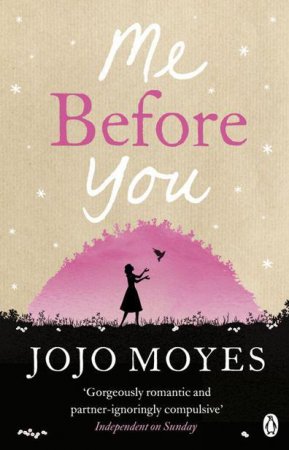 Me Before You
Me Before You After You
After You The Last Letter From Your Lover
The Last Letter From Your Lover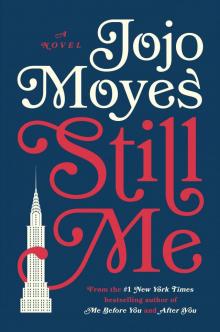 Still Me
Still Me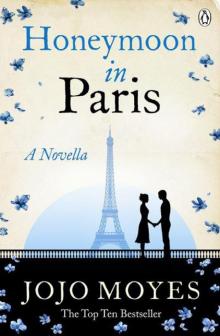 Honeymoon in Paris
Honeymoon in Paris Night Music
Night Music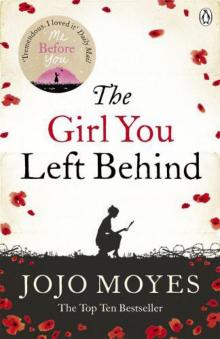 The Girl You Left Behind
The Girl You Left Behind Windfallen
Windfallen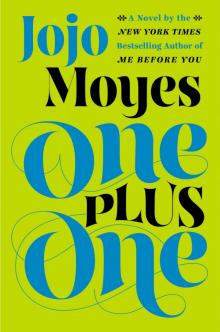 One Plus One
One Plus One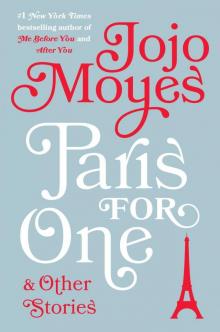 Paris for One and Other Stories
Paris for One and Other Stories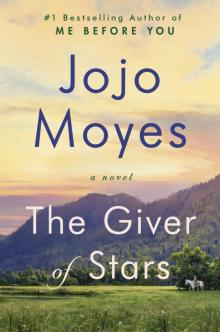 The Giver of Stars
The Giver of Stars The Ship of Brides
The Ship of Brides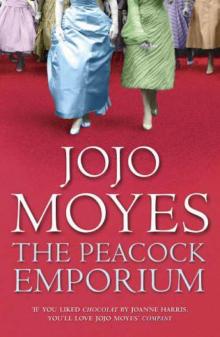 The Peacock Emporium
The Peacock Emporium Silver Bay
Silver Bay The Horse Dancer
The Horse Dancer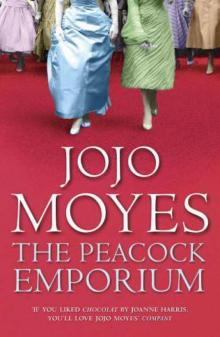 Peacock Emporium
Peacock Emporium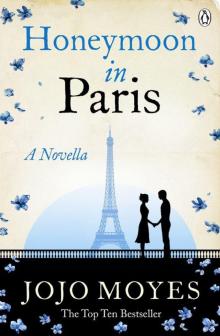 Honeymoon in Paris: A Novella
Honeymoon in Paris: A Novella Ship of Brides
Ship of Brides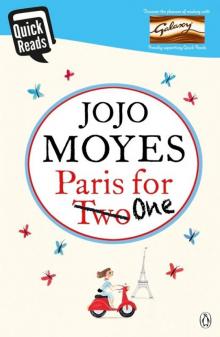 Paris For One (Quick Reads)
Paris For One (Quick Reads)